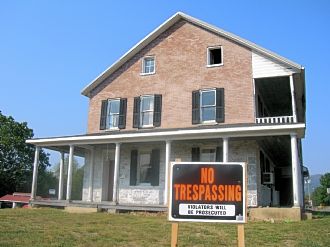
Physician Offers to Move Historic House in Mercersburg

The Smith House is located next to the MMP&W Volunteer Fire Co. The board that oversees the fire company says it needs the land to expand its aging facilities. Len Barcousky/Post-Gazette
A Franklin County doctor has offered to relocate the historic Justice William Smith House in Mercersburg.
“I have a love of history,” Paul Orange said Monday.
He was reluctant to provide too many details of his proposal, but he said he was prepared to cover the costs of moving the two-story structure to a new location. Those expenses, including the cost of acquiring a suitable alternate property, could run as high as $100,000.
Dr. Orange has a family practice along Route 30 in Fayetteville, which is between Chambersburg and Gettysburg. He said he moved to the area in part because of its ties to important events during the Civil War. He is a graduate of Greensburg Central Catholic High School and St. Vincent College. After graduating from medical school at the American University of the Caribbean, he did his residency at Latrobe Hospital.
The Smith House is located next to the MMP&W Volunteer Fire Co. on Mercersburg’s Main Street. The board that oversees the fire company says it needs the land on which the house sits to expand its aging facilities, and it has sought bids for demolition of the building. Its initials stand for Mercersburg, Montgomery, Peters and Warren, which are the communities it serves.
The bids are to be opened Thursday, but the fire company has not said when it will award the contract.
Dr. Orange said he has submitted an offer to move the structure, which would save the fire company the expense of tearing it down.
His proposal has gained the support of a small citizens group, the Committee to Save the William Smith House, which has sought to head off any demolition plans.
“This is an amazing turn just when I thought we were dead in the water,” said Karen Ramsburg, who heads the Smith House committee. “I’m surprised and excited.”
One potential new home for the 18th-century building is the nearby site of a former gas station owned by the First National Bank of Mercersburg.
“The best-case scenario would be to keep the house in its current location,” Ms. Ramsburg said. “Moving it across the street would be the next best thing.”
In 1765, the Smith House was the meeting place for mainly Scotch-Irish settlers who organized themselves into a militia for defense against Indian raids.
Their efforts morphed into attacks on British supply trains and a siege of a nearby British military base called Fort Loudoun. Those early instances of armed resistance took place eight years before the Boston Tea Party and 10 years before the battles of Lexington and Concord.
“It could be said that people in this house provided the spark for the American Revolution,” Dr. Orange said.
Architectural details and property records indicate that the house was built between 1751 and 1759, which includes a portion of the French and Indian War. Porches and a second story were added during the 19th and 20th centuries.
The structure’s connection to the region’s early Scotch-Irish settlers has drawn the attention of an outdoor museum in Northern Ireland.
The Ulster American Folk Park has been working on plans to take apart the 18th-century “historic core” of the stone structure, ship it to Europe and reassemble it outside Belfast.
The folk park already has several other buildings from southwestern Pennsylvania with links to Scotch-Irish immigrants who settled here.
Members of the group seeking to save the house have said relocation to Northern Ireland was a better option than demolition, but they would prefer to have it remain in Franklin County.
Mercersburg is about 150 miles southeast of Pittsburgh.
